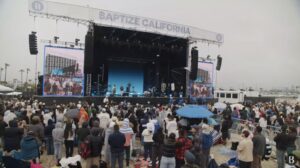Date Posted: 2024-11-19 00:46:50 | Video Duration: 00:38:51
In a time marked by increasing polarization and conflict, the challenge for Christians is to engage with the world in a way that is both edifying and faithful. The question arises: how can believers remain true to their faith while being a compelling witness in a diverse society? Darrell Bock, a best-selling author and academic, offers insights on how Christians can navigate these complexities.
Darrell Bock’s Journey to Faith
Darrell Bock, the executive director of Cultural Engagement and a senior research professor of New Testament Studies at Dallas Theological Seminary, shared his personal journey to faith. Initially raised in a non-Christian home, he was introduced to Christianity during his high school years through friends who continually shared their beliefs with him. One significant influence was Scott Ray, a friend who embraced Christianity through a youth camp experience.
Bock recounted his college days as an agnostic, where he humorously prayed, “God, I don’t know if you exist, but if you do, please don’t give me a Bible-caring person for a roommate because I want to enjoy my college years.” Ironically, his college roommate was indeed a Christian, and his lifestyle eventually drew Bock to Christianity. This transformation led to the formation of a Bible study group at the University of Texas at Austin, which grew significantly by his senior year.
Engagement in a Divided World
Bock emphasizes that cultural engagement should be relational, focusing on how to connect with others meaningfully. He stresses that people are not the enemy but the goal of the Great Commission, which instructs believers to make disciples worldwide. This perspective reminds Christians of their journey from turning away from God to finding grace, suggesting that believers should approach others with the same grace they received.
Challenges of Modern Cultural Engagement
According to Bock, the church faces challenges in cultural engagement due to a shift from being the “home team” to being seen as “visitors” or even rivals in society. This has led to a culture war mentality, where ideas are seen as needing defeat rather than understanding. Bock cites Ephesians 6 to highlight that the battle is not against people but against spiritual forces, urging Christians to rely on their faith rather than political ideologies.
He also highlights the lasting impact of the fundamentalist-modernist controversy, which split Christianity into factions focused on theology versus public ethics. Bock calls for a holistic theology that acknowledges God’s concern for all aspects of life, including public spaces.
A Theology of Engagement
Bock argues for a theology of engagement that is relational and emphasizes showing rather than just telling. He encourages Christians to live distinctively, making decisions based on faith and demonstrating hope and love. In public spaces, he suggests finding common ground and engaging in conversations that prioritize understanding over conflict.
Ultimately, Bock believes that the church’s role is to invite people into a new life through the gospel, focusing on love and connection rather than judgment. This approach, he argues, can help bridge divides and foster a more inclusive and constructive engagement with the world.




